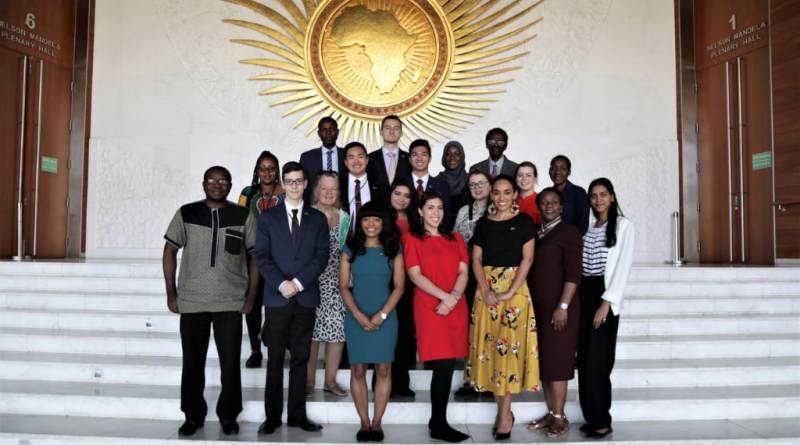Students Attend Study Abroad Trip in Ethiopia
Joaquin Matamis
Staff Writer
During the 2019 Spring break, fifteen diplomacy students and I had the opportunity to study abroad in Ethiopia. The trip’s parallel academic course, African Union Conflict Resolution Mechanisms, was open to both undergraduate and graduate students alike. Dr. Assefaw Bariagaber, Professor of African Studies and the Post-Conflict State Reconstruction and Sustainability Certificate Program, led the trip alongside Susan Malcolm, General-Secretary of the School of Diplomacy.
Dr. Bariagaber’s course was designed to ask and answer two particular questions: Has the AU contributed in some way to the positive developments in Africa? What is the AU’s role in conflict resolution? During our first few days, we immersed ourselves in the culture of Ethiopia. The group was quickly introduced to the hot weather of Ethiopia’s dry season, which was a welcome change to the winter of the American mid-Atlantic region. The country offered a variety of new foods to try including injera, the country’s signature sourdough flatbread, and the occasional Tej, or honey wine.
Our group visited many historic and cultural sites. The first included the towering “stelae” obelisks of Axum. These stelae, originating from the year four AD, marked the tombs of ancient kings and remain iconic symbols of Ethiopia’s ancient capital city. The “Fasil Ghebbi” castle compound of Gondar was a remarkable sight. The 17th century medieval grounds housed the remains of Emperor Fasilides’ fortress, Empress Mentewab’s castle, and many other surviving buildings like the stables and dance hall.
Perhaps my favorite were the churches of Lalibela. Their most unique feature lies in the construction: each church was hewn out of a single rock and all still survive from the 13th century with little restoration. Charlidza Pierre, a graduate student who attended the trip, said, “I think it was really impressive how they were built from the top down, especially considering the resources they had at the time.”
Each city gave us a glimpse of the different lifestyles and regional traditions of the Ethiopian people, varying from unique Christian practices to distinct art and architecture. Following the cultural component were the academic and diplomatic activities. The U.S. Embassy in Ethiopia welcomed our delegation with open arms, even hosting a number of guest speakers to explain the operations of the missions to Ethiopia and the AU itself. Students could ask questions and gain greater insights on organizations like the U.S. Agency for International Development (USAID) and the various political, security, and economic branches of the American embassy. We even had the chance to meet with the U.S. Ambassador to the AU: The Honorable Mary Beth Leonard.
Our delegation also met with the United Nations Economic Commission for Africa (UNECA), which held a lecture on the improved economic condition of Africa as a whole. Students learned more about the regional economic communities that make up Africa, such as The Southern African Development Coordination Conference (SADCC) and The Economic Community of West African States (ECOWAS), as well as future issues with gaining economic stability and unity.
The highlight of our trip, however, was our visit to the AU headquarters itself. Staff members greeted us and gave a tour of the facility and grounds. The illustrious conference center and office complex hosts the annual Assembly of African nations, and rivals the UN headquarters in both size and beauty. The trip ended with talks from various AU commission heads and administrators, who discussed different matters of peace and security in Africa.
While any study abroad trip is fruitful for students, the trip to Ethiopia was certainly a memorable one. Students found themselves at the heart of the developing African world and in the middle of the thriving, bustling metropolis of Addis Ababa. With the combined wealth of culture, history, and new-found economic prosperity, the trip, according to Dr. Bariagaber, “came at the right moment.” The professor also added his own words of praise, stating, “Students loved it! Some of them [from past years] even went back and formed an NGO. It seems to me that many students fell in love with the country itself.”
With the amount of opportunities at Seton Hall, students will find attending study abroad trips like Ethiopia well worth their time. The School of Diplomacy hosts a number of study abroad trips and seminars. When asked again about Ethiopia, Dr. Bariagaber added his final words: “There is a lot to be seen and students will be well served to see the country… It truly creates a lasting impression.”



